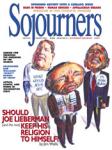All Catholics are Zapatistas, all evangelicals are paramilitaries, and Jesus is a member of the PRI party—to many involved in the struggle for land, food, and religious freedom in Chiapas, Mexico, these pseudo-verities provide all the justification needed for armed conflict. Religious divisions already present have been exacerbated by misconceptions such as these under a strategy of low-intensity warfare.
Creatively seeking to induce further strife among indigenous groups, and using "religious divisions" as one label on which to pin responsibility for current problems, the Mexican government has systematically fanned flames of unrest between churches. Doing so has allowed the government to further justify its military presence as a "peace-keeping force." Scriptural manipulation further complicates the melee: The government often cites Romans 13 to keep evangelical paramilitaries under its thumb. Tensions exploded in the highland community of Actealin in 1998, when a predominantly Presbyterian paramilitary force slaughtered 45 men, women, and children, all members of the Mayan Christian pacifist group Las Abejas.
But into this maelstrom has blown a calming zephyr. Seeking new ways to foster peace between churches in a conflict that is often Christian fighting against Christian, several United Church of Christ missionaries joined hands with the Catholic Diocese of San Cristobal to create a space for ecumenical dialogue. With its first course on conflict resolution in 1998, the Ecumenical Bible School was born.
The school began with the idea of bridging Catholics and Presbyterians, but soon Baptists joined the mix. "And then," said Eduardo "Lalo" Rodriguez, a Mennonite pastor teaching at the school, "something funny happened—Catholics and Protestants started reading the Bible together." Once these ecumenical weekend Bible studies began, old divisions and misunderstandings began to crumble away.
A major supporter of this new dialogue in Chiapas was Samuel Ruiz, then-bishop of the San Cristobal diocese. In their first meeting, Ruiz told Lalo, "If you will be radical Mennonites and we be radical Catholics, we’ll meet on the road to peace." Lalo emphasizes Ruiz’s role in breaking down divisions in Chiapas.
The new prelate, Bishop Felipe Arizmendi, is known to be conservative, and it remains to be seen whether he will support or ignore the ecumenical work begun by Ruiz. Yet the popular ethos among catechists in the diocese remains highly optimistic that Arizmendi will be changed by the people.
The Ecumenical Bible School has tried to continue, in a structured setting, the kind of reconciliation work begun by Ruiz. The school’s theological approach is similar to that of the diocese, applying a theology of liberation. "We think that if a gospel is preached that doesn’t liberate people," Lalo says, "it’s not the gospel of Jesus."
The school’s emphasis on the liberating nature of the gospel is directly reflected in the kinds of courses it offers, which deal with all aspects of people’s lives, from the mundane to the theoretical. There are courses in community health, women’s issues, and organic agriculture, as well as in Christology, pastoral training, and conflict resolution.
The school provides a place for men and women of different denominations to meet and read the Bible, to eat, sleep, and pray together, and to realize that they are all brothers and sisters in Christ. The school is open to anyone who wants to come, be they Catholic or Protestant, Zapatista, or even paramilitary. "We believe in a peace very different from most people’s idea of peace here in Chiapas," Lalo says. "Many think peace simply means getting rid of hostile groups. We believe that peace means healing the brokenness between people."
When asked about the hardships of working with groups that hate each other, Lalo said, "We (at the school) have had very rich experiences that make us forget the difficulties. For instance, we’ve had groups meet for a three-day weekend Bible study. At the beginning Catholics and Protestants wouldn’t even speak to each other. But by the end of the course, people from one group were asking how they could serve the other group, even asking what specific ways they could pray for one another.
"We aren’t a group of experts here at the Bible school," says Lalo. "It’s only the Spirit of God that guides us."
FRED BAHNSON, a member of the July 2000 Christian Peacemaking Team delegation to Chiapas, is a recent graduate of Duke Divinity School. He returned to Chiapas this fall to work with CPT and the Ecumenical Bible School.

Got something to say about what you're reading? We value your feedback!